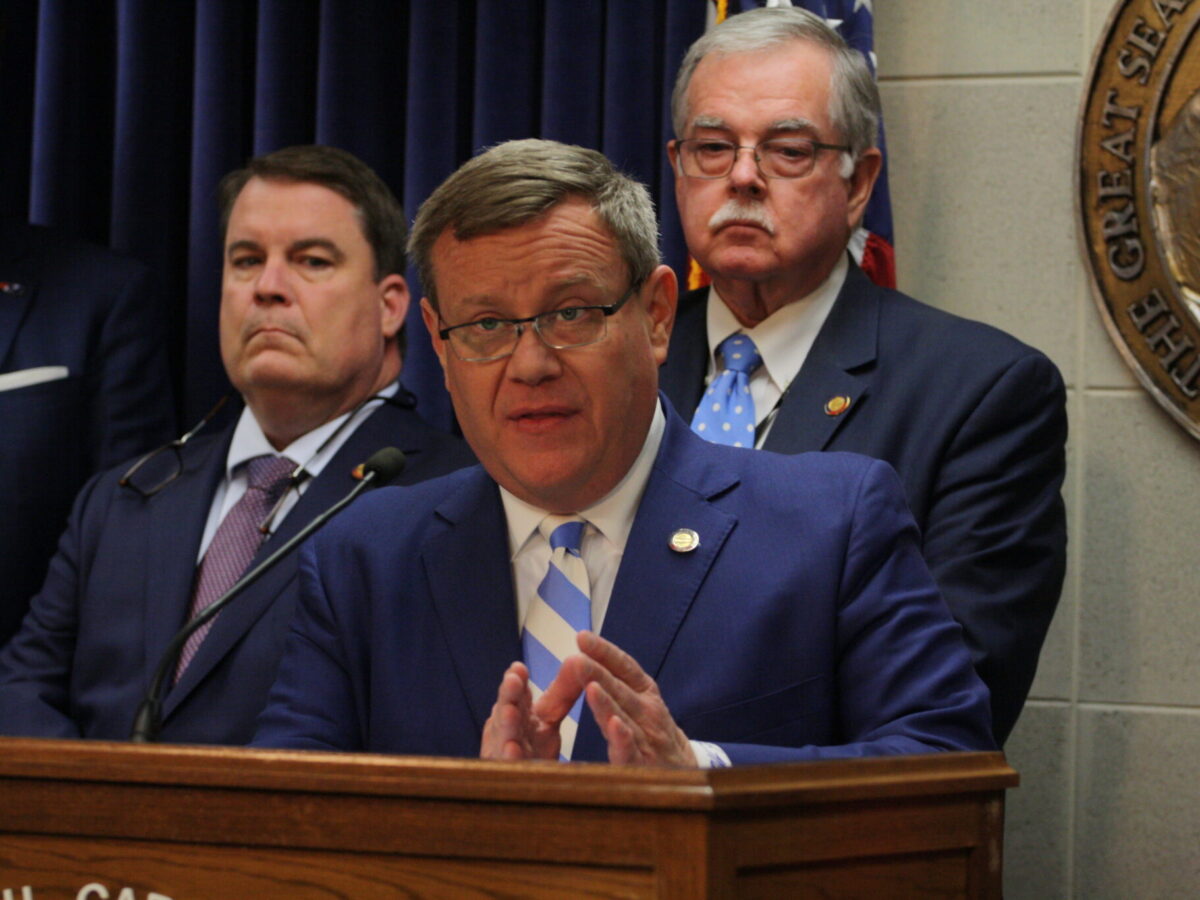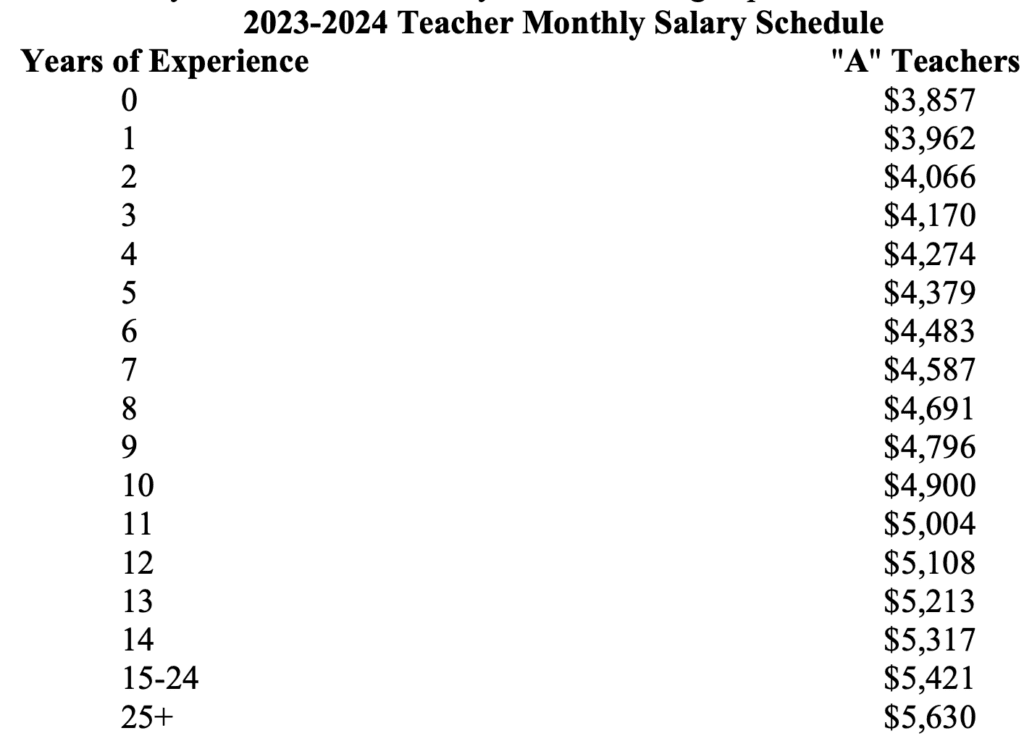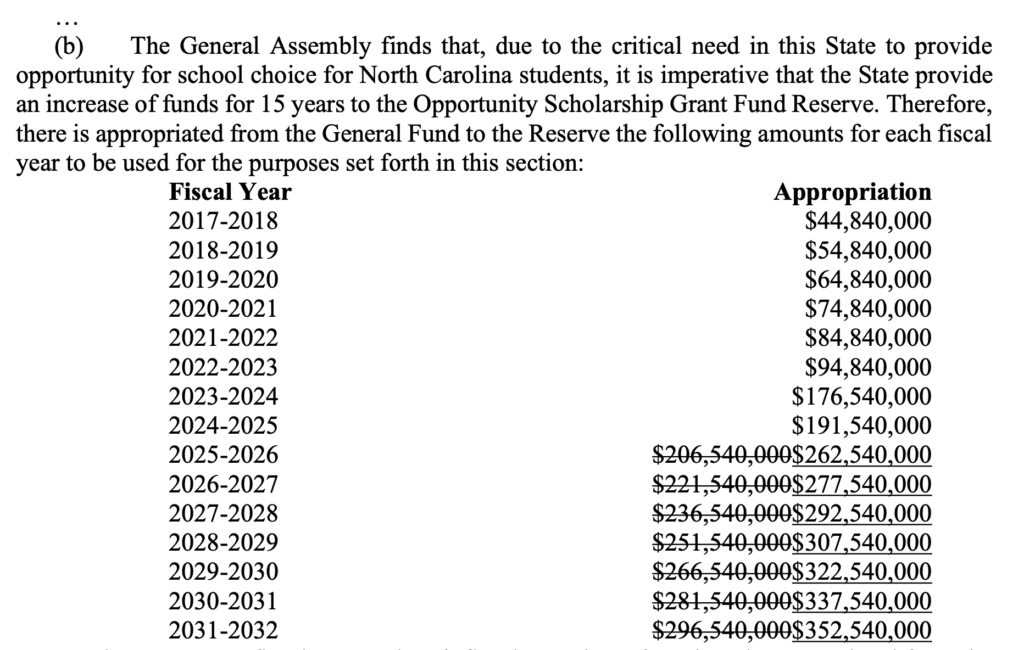
|
|
The House dropped its spending plan for the biennium during a press conference Wednesday. The proposal includes 7.50% across-the-board pay raises for teachers over the biennium and $70 million additional dollars for a program that helps districts provide higher supplements for teachers.
The House budget appropriates about $11.7 billion for 2023-24 and about $12.3 billion for 2024-25 for the state Department of Public Instruction (DPI), which is responsible for the bulk of K-12 education items.
The budget proposal from Democratic Gov. Roy Cooper, which dropped a few weeks back, included $13.4 billion in the first year and $14.3 billion in the second year for DPI.
The last biennium budget in 2021 spent $10.6 billion on DPI for 2021 and $10.7 billion for 2022. The revised 2022 budget, passed the following year, changed the second year number to a total of $11.3 billion for DPI.
Meanwhile, it’s important to remember that the state is anticipating a $3.25 billion surplus.
Now that the House has released its proposal, the Senate will release its own. The two chambers will then work on a compromise budget that will eventually make its way to the governor for his signature or veto.
See the money report for the House proposal here.
See the bill text for the proposal here.
Teacher pay raises
The House broke from the long-standing tradition of giving average teacher pay raises in their latest budget proposal. In other years, both chambers in the General Assembly generally propose pay raises where some teachers may get more than others. But the proposal by the House is across-the-board, meaning all teachers will get the same percentage raise.
Under the proposal, teachers could expect a 4.25% pay increase in the first year of the biennium, and a 3.25% pay increase in the second year. Those are across-the-board. And those pay increases actually apply to all school personnel, including non-certified workers.
When step increases are included, for those who are slated to get them, teachers will get an average pay raise of 10.2% over the biennium.
Here is the proposed teacher salary schedule for 2023-24.

This is much smaller than the pay raise proposed by Cooper, which amounted to a minimum raise of 10% for all teachers in the first year of the biennium and a minimum 6% pay raise in the second year.
However, the House proposal also includes an additional $70 million in both years of the biennium for a program that provides funding for local districts to boost their local teacher supplements, meaning that many teachers will be getting additional pay increases. The program emphasizes funding for lower-wealth districts. The revised appropriation for that line item is now $240 million.
According to a General Assembly document, when you include supplements with the teacher pay increases and normal step increases, teachers stand to made an additional 11.2% over the biennium on average.
The State Board of Education and DPI asked for teacher raises at or above 10% in total.
In addition, the proposal also reinstates master’s pay for teachers. Teachers who had master’s degrees used to get additional pay because of their educational attainments, but this was eliminated by Republicans years ago. Nearly every session, a chorus of voices asks for it to be reinstated.
House Republicans are also including $10 million recurring in both years of the biennium for paid parental leave for educators.
Principals would also get the same 7.50% increase over two years as teachers, as would bus drivers and other non-certified personnel. In addition, bus drivers would get another additional 2% pay bump on average in an effort to deal with school bus driver shortages.
Other K-12 items
There are a number of things to go through in the K-12 budget. Everything from opportunity scholarships, to teaching fellows, and even a provision that could increase the number of renewal schools.
School nurses
The House budget is changing the name of the school psychologist allotment to the school health personnel allotment, which will now also include nurses, counselors, and social workers for schools. The budget plan provides funding for an additional 120 positions in this allotment.
Teaching fellows
One item in the budget that many people have been asking for is an expansion of the N.C. Teaching Fellows program. The program provides forgivable loans for students wanting to become teachers in North Carolina.
The House budget expands the program to all public colleges and universities as well as four private ones, and it expands the subject matter eligible to include all subjects. Previously, it was focused mainly on those who wanted to become STEM teachers.
This is a long-awaited revival. The Teaching Fellows program previously existed in another iteration before being discontinued by the Republican-led General Assembly. A few years back, it was revived in a more limited form.
Improving math performance
In an effort to prevent math difficulties for students entering middle school, the budget proposal would cap class sizes in grades four and five at 24 students. There are class size restrictions for the earlier grades, but they fall off after third. The proposal also includes funds to hire teacher assistants for fourth grade.
There are a number of other items related to this effort, including diagnostic assessments, interventions, and remediation requirements, and a mandate for local school boards to report to the State Board of Education.
Academic transparency
The budget proposal includes a provision similar to one from 2021 that would force districts to make available to the public information on what instructional materials and activities are being used in classrooms. The information would be included on a school’s website and organized by subject and grade.
A local community media advisory committee would also have to be formed by local boards of education to investigate and evaluate challenges to instructional materials.
Academic standards
The budget proposal creates a commission to develop recommendations for the standard course of study. Those recommendations would go to the State Board of Education for acceptance or rejection. This is a departure from how the standards are currently revised. Typically, standards revisions goes through DPI and are voted on by the State Board, but this commission would be independent from the agency.
The State Board of Education came under some scrutiny a few years back following the long process of revising its social studies standards, which some critics saw as depicting the United States negatively.
A line in this section of the budget plan calls out these standards in particular. It has the newly created commission studying the social studies standards and providing recommendations to the State Board of Education about them by January 2025.
Renewal school districts
The budget proposal includes language that could expand the presence of renewal school districts in North Carolina. These are traditional public school districts that have similar flexibility to charter schools.
Currently, there is one renewal school system — Rowan-Salisbury — where all the schools can operate as renewal schools.
The 2018 short session budget included the provision that allowed Rowan-Salisbury to become a renewal school system. It essentially allowed the school district in the state with the highest percentage of restart schools to become a “renewal school district.”
Under the language in this budget proposal, a school district is eligible to become a renewal system if it meets one of two criteria. One of those is that it has the highest percentage of restart schools, is eligible for low-wealth supplemental funding, and has more than 10,000 students.
The second is if at least 60% of the schools in a district meet or exceed growth, and spend less than $6,700 in per pupil funding from state sources.
Opportunity scholarships
The budget proposal also expands the eligibility for the state’s opportunity scholarship program. Basically, the change allows students in grades three through eight to be eligible for the awards without having previously attended a public school.
This is a different proposal than bills filed in both the House and Senate that would expand eligibility for the program to all students. The budget plan also increases the amount of money that automatically goes into the program’s reserve fund each year.

Opportunity scholarships provide public dollars to students that can be used to attend private schools.
Other items
The House budget plan directs DPI to come up with a way to fund school systems differently than it currently does. At the present, schools are funded based on projected enrollment. This would have DPI figure out how to fund schools based on the prior year’s actual enrollment.
The budget proposal also includes language from a couple of bills that have already been in the legislature this session, including creating career development plans for middle and high school students, and transferring control of the state’s schools for the deaf and blind from the State Board of Education to boards of trustees appointed largely by the General Assembly.
In addition, the proposal includes language from a bill that allows for the creation of remote charter academies and extends the pilot of the state’s two virtual charter schools.
The budget proposal would change the role of the charter school advisory board. It would now be called the Charter School Review Board, and it will have the final power to “approve or deny charter applications, renewals, and revocations,” rather than the State Board of Education.
The budget plan includes $7.8 million in non-recurring dollars to “satisfy any outstanding meal debt,” that a school has. The language in the budget bill says that if the money isn’t enough, then money can be taken from the State Public School Fund to make up the difference.
The budget proposal includes language that would have DPI create a model for funding children with disabilities based on the reported costs of their services.
It also creates a task force to study the opportunity gap and come up with ways to shrink it.
Early childhood
The Division of Child Development and Early Education (DCDEE) of the Department of Health and Human Services would receive funds for a variety of programs.
Smart Start would be getting over $160 million in both years of the biennium recurring under the proposal, including an additional $5 million recurring.
The division would get $47 million in both years of the biennium from the state general fund for pre-K, with no additional funding allocated.
An additional $24 million would come in the second year of the biennium to increase the child care subsidy reimbursement rate. The budget also adjusts federal funds for child care block grant funding to help with the reimbursement rate. This amounts to $48 million recurring in both years of the biennium.
Those same pay increases that teachers and other school employees are getting will also come to state employees working in this department. To recap, it’s 4.25% in the first year and 3.25% in the second year.
Community colleges
The proposed budget includes $1.5 billion for the N.C. Community College System (NCCCS) in both years of the biennium — including those same 4.25% across-the-board salary increases in 2023-24 and 3.25% increases in 2024-25. The budget would also provide $25.9 million in recurring funds toward faculty recruitment and retention for faculty in certain courses both years.
The proposed 7.5% salary increase over the next two years is higher than the system’s request for 7%.
NCCCS also requested a $232 million increase in state funding over two years, $145.88 million of which would be for student investment. That funding would provide flexible funding to each college to expand program capacity, system leaders have said.
The proposed budget does not directly include that $145.88 million line item. It does have almost $16 million recurring in both years for enrollment growth adjustments, and $1 million in recurring funds to increase the formula budget allocated for each Basic Skills full-time equivalent student.
The proposed budget also includes several workforce-focused items. There is $15 million in nonrecurring funds the first year of the budget to waive state registration fees for continuing education and workforce development courses.
“In subsequent fiscal years,” the proposed budget reads, “the Community College System enrollment funding formula shall adjust for the receipt loss caused by waivers without reducing formula budget requirements.”
The budget also includes $20 million in nonrecurring funds both years of the budget to expand health care programs, and $15 million in nonrecurring funds both years to support high-cost workforce programs — with $10 million each year required to support nursing programs.
There is $5.5 million in nonrecurring funds the first year of the budget to expand apprenticeship opportunities for students 16-25 in high-demand fields, and $2.5 million in nonrecurring funds both years for the System Office to contract with Graduation Alliance, Inc. for the development of a workforce diploma program.
The budget also includes $25 million recurring in both years for the Longleaf Commitment financial aid program, which was previously funded through pandemic relief money.
There is also $1 million in nonrecurring funds the first year of the budget for a NCCCS marketing initiative “to increase awareness about community college course offerings and State financial aid opportunities.”
The budget also includes additional funding for the Child Care Grant Program, with a revised net appropriation of $3 million each year of the biennium.
Finally, there is also $7 million in nonrecurring funds the first year for myFutureNC to conduct a study on “the operating model and supporting technology necessary to support interoperability and interconnectedness across the State’s K-16 data ecosystem.”
Editor’s note: This article has been updated to clarify totals for spending on early childhood education.





